Last year summer, I was in some places in Thüringen to attend an organ academy. My first stop is Eisenach, the birthplace of Johann Sebastian Bach (1685- 1750). Bach is my all time favourite composer, of course, I visited the Bach museum in Eisenach (Bachhaus Eisenach), where he once lived.
The exhibition begins with Instrument hall. It displays a selection of original baroque instruments. Following exhibition is about how Bach actually look like with historical and archeological evidence. The first room on the upper floor presents Bach’s musical stages in his life:
Eisenach/Ohrdruf/Lüneburg (1685-1703)
Arnstadt (1703-1707)
Mühlhausen (1707-1708)
Weimar (1708-1717)
Köthen (1717-1723)
Leipzig (1723-1750)
When I was between “Mühlhausen” and “Weimar”, I passed by a black room. I did not pay much attention to the black room, I thought it was under construction and closed for visitor. Suddenly I heard music come from the room:
“Am Abend, da es kühle war … ”
The beautiful recitative in Bach’s St. Matthew Passion! But only for a few seconds, then I heard a speaking voice. Out of curiosity, I went into the black room and saw this.
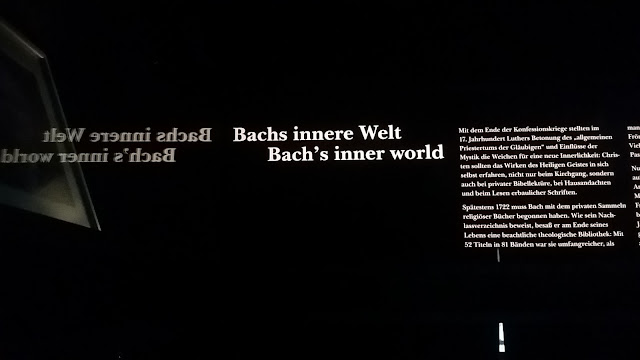
Full text of Recitativo (64) in St. Matthew Passion BWV244
Am Abend, da es kühle war,
ward Adams Fallen offenbar;
am Abend drücket ihn der Heiland nieder.
Am Abend kam die Taube wieder
und trug ein Ölblatt in dem Munde.
O schöne Zeit! O Abendstunde!
Der Friedensschluß ist nun mit Gott gemacht,
denn Jesus hat sein Kreuz vollbracht.
Sein Leichnam kömmt zur Ruh,
ach! liebe Seele, bitte du,
geh, lasse dir den toten Jesum schenken,
o heilsames, o köstlichs Angedenken!
Christian Friedrich Henrici – Picander
At even, sweet cool hour of rest,
was Adam’s fall made manifest.
At even ends the Saviour’s cross and pain;
At even come the dove again,
with leaf of olive in her bill.
O lovely hour so cool and still!
Our peace with God is evermore assured,
for Jesus hath His cross endured.
His body rests in peace.
Ah, thank Him ever, never cease,
soul, think of Thou of thy Saviour, lying yonder,
o holy thought, o precious thought to ponder.
English translation by Henry S. Drinker
This is how the books look like, and the picture below is a picture of the theologian Heinrich Müller.
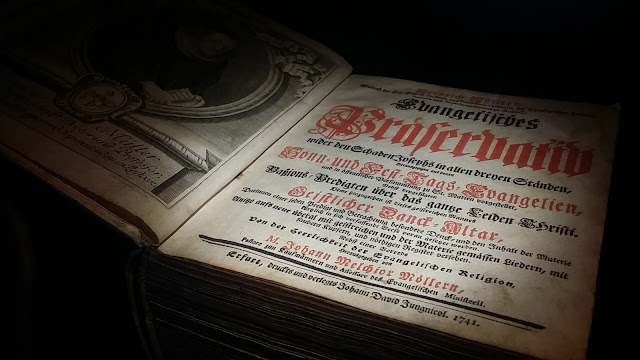
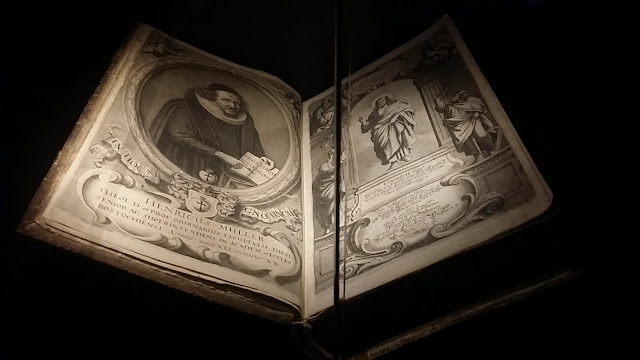
After I listened to all the audio guide in Bach’s library, I continued to look at the exhibition of Bach’s life with illustration and text. Later, I came to his kitchen, living room, bed room and the study room.
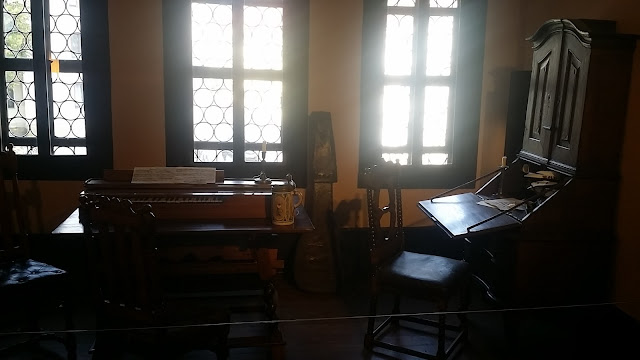
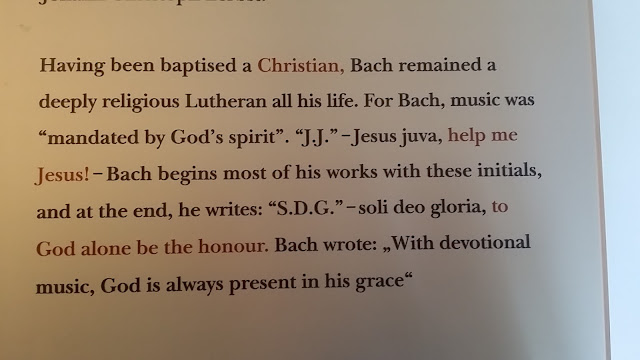
Great composer like Bach was so humble, I think it was his humbleness that made him great. It is unrealistic to learn all the Bach’s organ works in my lifetime, but it is very realistic to learn this J.J. and S.D.G. from Bach. I can do my best to practice or whatever need to be done, but for those things that beyond my control, just pray – Help me, Jesus. When things successfully done, I know it is not about me at all, but God has helped me, therefore, God alone be the honour.
Click on this link for a 3D virtual tour in Bach’s house:
https://bachhaus-eisenach.de/en/museum/3d-rundgang
p/s start with the Instrument Hall
More reading (in German):
Dass ausgerechnet Christian Friedrich Henrici („Picander“) als Libretto-Dichter in Bachs Matthäuspassion figuriert, hat durchaus etwas „Pikantes“. Galt er doch als Leichtfuß, der gern auch schlüpfrige Verse schrieb; bibelfest war er gleichwohl. Der Rostocker Universitätsprofessor und Superintendent Heinrich Müller hatte eine Predigtsammlung herausgegeben, an die sich Henrici anlehnte und von ihm theologische Gedanken bezog. Müllers Werk stand auch bei Bach im Bücherregal. Bach wird wohl seinem Textdichter da und dort etwas Nachhilfe gegeben und ihn auf Müller verwiesen haben. Ein schönes Beispiel ist die Passage in Müllers homiletischer Sammlung: „Am Abend, da der Tag kühle geworden war, kam die Sünde der Menschen ans Licht; am Abend nimmt sie Christus wieder mit sich ins Grab, dass ihr nicht mehr gedacht werde. Um die Vesper-Zeit kam das Täublein Noah zum Kasten.“ Dieses Motiv findet sich nun in Satz Nr. 64 dichterisch ausgefeilt durch die Anapher-Motivik mit dem Buchstaben A: „Am Abend, da es kühle war, ward Adams Fallen offenbar.“
Pfarrer Prof. Dr. Klaus Müller
Landeskirchlicher Beauftragter für das christlich-jüdische Gespräch